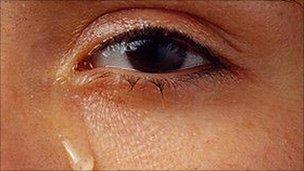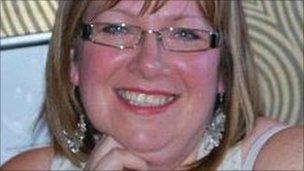Miscarriage mums assured 'healthy baby still possible'
- Published
- comments

Estimates suggest a fifth of pregnancies miscarry
Women with repeated miscarriages can be reassured that their chance of having a healthy baby is the same as women who have never miscarried, say experts.
The news comes from a large meeting in Sweden where doctors are discussing the latest advances in fertility medicine.
The findings in over 1,000 women should offer some comfort to the 1% of couples who have lost three or more pregnancies in a row through no known cause.
Often the reasons for recurrent miscarriages cannot be found.
This can be an added source of stress and leave a couple wondering why they were affected.
Renewed hope
Most recurrent miscarriages are unexplained, meaning there is no obvious cause, and no treatment to offer.
Faced with this uncertainty, it can be difficult for couples to decide what action to take.
But researchers say they can now offer couples more accurate information to help them when they are considering whether or not they want to keep trying for a baby.
Two new studies, presented at the European Society of Human Reproduction and Embryology meeting in Stockholm, followed the outcomes of women with unexplained recurrent miscarriage.
The first - a Danish study that involved nearly 1,000 women - found two-thirds went on to have at least one child, mostly within five years of being diagnosed and referred to a recurrent miscarriage clinic, but often within a year of being seen.
The second study, carried out in the Netherlands with 213 women, found more than 70% became pregnant after a year of trying for a baby, rising to over 80% or eight out of 10 after two years of trying.
And over half of all the women in the study gave birth to a healthy baby, within an average wait of 41 weeks to conceive.
Dr Stefan Kaandorp, who led this Dutch research, said: "Our results mean that women with recurrent miscarriage can be reassured that their time to a subsequent conception is not significantly longer than that for fertile women without a history of miscarriage.
"Recurrent miscarriage is extremely stressful for these women and we hope that our study will give them hope and encourage them to keep trying for the baby they want so much."
A spokeswoman for the Miscarriage Association said: "One of the big issues for women going for investigation for recurrent miscarriage is that they expect answers.
"For them, a diagnosis means treatment and treatment equals a baby. But that is not always the case."
She said finding no underlying cause could be good news because it means they have a good chance in the future of becoming pregnant and having a healthy baby.
Professor Siobhan Quenby, consultant obstetrician at Warwick Medical School in the UK, said she would be using the findings to help counsel her patients.

Carol is undecided about whether or not to try for another baby
"The majority of patients I see with unexplained recurrent miscarriage feel like giving up. I spend a lot of my time trying to encourage them that they do have a good chance of going on to have a baby. It is good to have this latest data to put a figure on it."
But the prospect of trying again can still be daunting.
Carol, aged 39 and from West Lothian, is not convinced that she wants to face the possibility of a fifth miscarriage, having already had four.
"At the moment, I feel like I would be happier not to fall pregnant again. I'm not sure I want to go through the stress and trauma again.
"It's not just me who is upset and disappointed every time. It's my husband and my family that feel it too."
"And I'm going to be 40 in a couple of months and I consider that my time has run out."
- Published8 November 2010
- Published28 June 2010